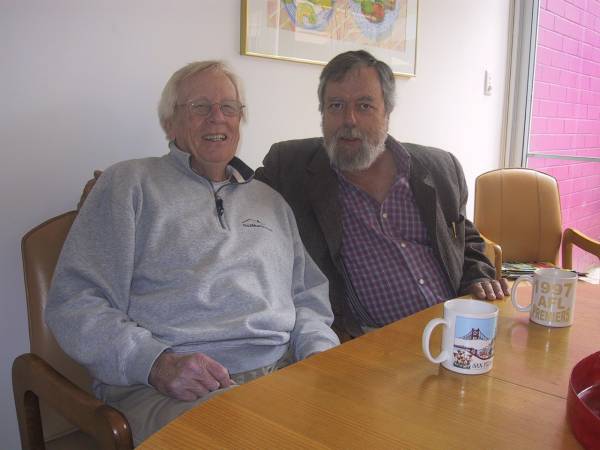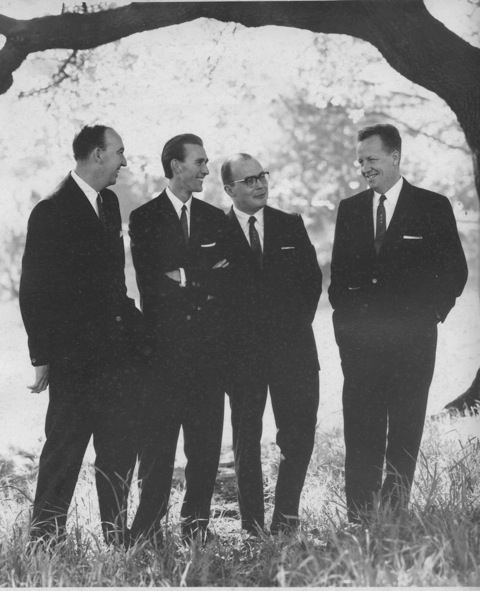
Bryce Rohde and Jack Brokensha arrived in Canada in 1953 filled with optimism about pursuing their musical careers in the Americas. The first music they heard, however, was the sound of a cell door slamming, having been jailed for landing with neither funds nor means of support. They were bailed out by the Australian colleague who had suggested they come, Errol Buddle, and a New Zealander, Don Varella. Having settled in Windsor, Ontario, immediately adjacent to Detroit, the foursome initially struggled. Buddle remembers dinner once consisting of three apples and half a loaf of bread between them. Yet within two years they were Australia’s most successful jazz export.
Hired by Detroit’s leading jazz club, The Rouge Lounge, to back singer Chris Connor, they stayed on when she left, becoming the Australian Jazz Quartet (AJQ) in 1954. Buddle has said that over the next four years they became the fifth-highest paid jazz band in the US, after Louis Armstrong, Dave Brubeck, Gerry Mulligan and George Shearing.
Bryce Benno Rohde (pronounced Roe-dee) was born on September 12, 1923, the second son of Gertrude Anne (nee Hall) and Benno Albert Rohde. His mother named him Bryce because while pregnant she read Peter B Kyne’s novel The Valley of the Giants with protagonist Bryce Cardigan. Rohde’s father, of German ancestry, had hoped to pursue architecture in Adelaide, but instead became a pastry-chef in Hobart, possibly fleeing anti-German sentiment following the Great War. The family returned to Adelaide, establishing Rohde’s Homemade Cakes, and Rohde attended Nailsworth Primary School and Unley High School. Both parents were amateur singers and Gertrude played piano, an instrument for which Rohde showed an early aptitude, studying classical music for seven years. Upon completing school he worked in the family bakery and began playing music professionally on the side.

During World War II Rohde joined the army, and also met his first wife, Barbara Ruth Coombe. Married in 1946, they had two sons (Kim and Rhett), but the marriage was short-lived. Having encountered jazz during the war, he joined the Adelaide-based Alf Holyoak Sextet at its conclusion.
Thereafter came Detroit and the AJQ, a band made distinctive by the sound combinations offered by Buddle playing tenor saxophone/bassoon, Brokensha vibes/drums and Dick Healy (an American) alto saxophone/flute/bass. Thanks to the American Booking Corporation (which also managed Miles Davis, Louis Armstrong and Dave Brubeck), they backed such singers as Helen Merrill and Carmen McRae, before becoming their own drawcard. They recorded and toured, taking their cool-school, aerated jazz into clubs, colleges and even Carnegie Hall. In 1955 they became a quintet with the addition of the first of several bassists, culminating in Ed Gaston.
In 1958 they played some farewell US concerts before their first Australian tour, after which the band broke up. Rohde settled in Sydney and formed the Bryce Rohde Quartet. Along with being a mainstay at the El Rocco they toured nationally supporting the Kingston Trio, during which Rohde discovered George Russell’s hugely influential book on improvisation, The Lydian Chromatic Concept of Tonal Organisation. From the moment he opened it he was a convert, and in turn converted bassist Bruce Cale and formed an exceptional band with Cale, Charles Munro (reeds) and Mark Bowden (drums).
In 1964 he married Valerie Jane Manning, with whom he had two daughters, Shana and Chelle. In 1965 they moved to California where he led bands, worked as a sideman, taught and occasionally recorded. The marriage ended amicably in the 1970s. In the early 1990s the AJQ reformed for an Australian tour and Rohde published Turn Right At New South Wales: The Collected Compositions of Bryce Rohde. One of those, the gorgeous Windows of Arques, was the theme of Jim McLeod’s Jazztrack on ABC Classic FM for three decades. His last Australian performance was at the 2003 Wangaratta Jazz Festival.
Rohde’s playing and compositions shared a flair for elegance and restraint, and his touch at the piano generated a muted luxuriance. Despite a stroke a few years ago he continued to play until not long before he died in his sleep at home in San Francisco on January 26. He is survived by Shana, Chelle, Valerie, Rhett, Kim and his brother John.